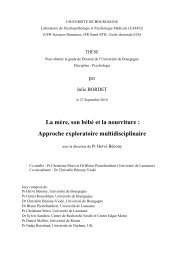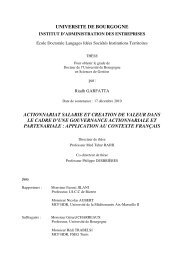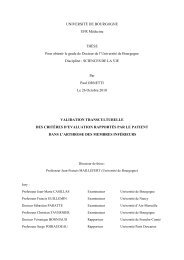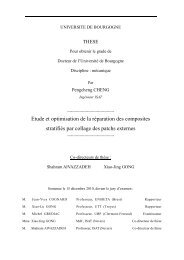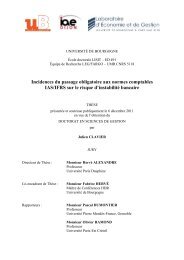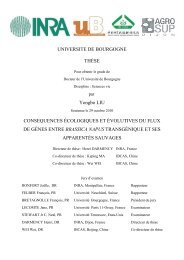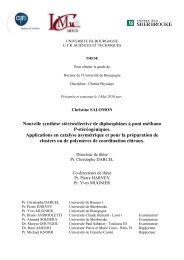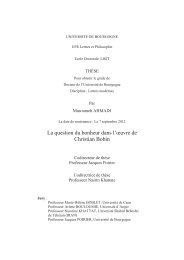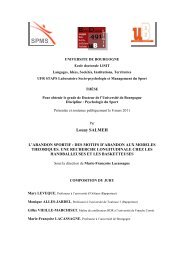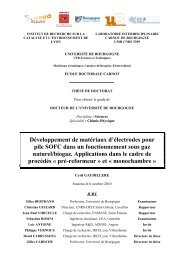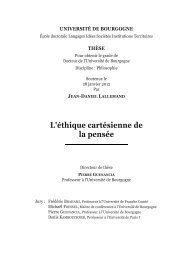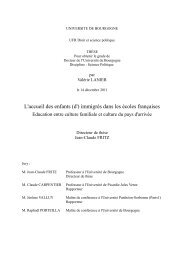Higher education in Asian countries and the role of international ...
Higher education in Asian countries and the role of international ...
Higher education in Asian countries and the role of international ...
You also want an ePaper? Increase the reach of your titles
YUMPU automatically turns print PDFs into web optimized ePapers that Google loves.
5.4 Effect <strong>and</strong> impact<br />
222<br />
It is very difficult to assess <strong>the</strong> impact <strong>of</strong> <strong>the</strong> IGO‟s <strong>in</strong>itiatives on any country‟s higher <strong>education</strong><br />
because <strong>the</strong> level <strong>of</strong> success <strong>of</strong> an actor depends upon o<strong>the</strong>r factors too, as it is expla<strong>in</strong>ed by<br />
game <strong>the</strong>ory related to organizations. The performance <strong>of</strong> IGOs measured <strong>in</strong> terms <strong>of</strong> outcomes<br />
may not be appropriate when <strong>the</strong>se organizations are constra<strong>in</strong>ed by various political <strong>and</strong> o<strong>the</strong>r<br />
factors, which are outside <strong>of</strong> <strong>the</strong>ir control; <strong>in</strong> such cases, it is difficult to l<strong>in</strong>k outcomes causally<br />
to <strong>the</strong> <strong>role</strong> <strong>of</strong> <strong>the</strong> <strong>in</strong>ternational organizations (Gutner & Thompson, 2010). In this context, it is<br />
<strong>in</strong>appropriate to credit or blame solely an IGO for certa<strong>in</strong> outcomes ei<strong>the</strong>r as a result <strong>of</strong> achiev<strong>in</strong>g<br />
<strong>the</strong> set objectives or vice versa. However, to study <strong>the</strong> IGO‟s <strong>role</strong>, one should see how actively<br />
that IGO tried to track <strong>the</strong> goals <strong>and</strong> whe<strong>the</strong>r it efficiently played its <strong>role</strong> <strong>in</strong> its member <strong>countries</strong><br />
through policy directions, capacity build<strong>in</strong>g, technical assistance, <strong>in</strong>formation shar<strong>in</strong>g monitor<strong>in</strong>g<br />
<strong>and</strong> report<strong>in</strong>g.<br />
Despite all limitations <strong>and</strong> criticisms regard<strong>in</strong>g <strong>the</strong> study <strong>of</strong> IGOs‟ <strong>role</strong>, it is true that IGOs are<br />
contribut<strong>in</strong>g active players <strong>in</strong> <strong>the</strong> process <strong>of</strong> development <strong>of</strong> higher <strong>education</strong> but not wholly<br />
solely responsible for develop<strong>in</strong>g higher <strong>education</strong> <strong>of</strong>/ <strong>in</strong> any country or region. As society <strong>and</strong><br />
state are <strong>the</strong> key players at national level so <strong>the</strong> major responsibility lies with <strong>the</strong>m to work for<br />
<strong>the</strong> development <strong>of</strong> higher <strong>education</strong> through effective <strong>in</strong>itiatives <strong>in</strong>clud<strong>in</strong>g cooperation <strong>and</strong><br />
collaboration with <strong>the</strong> IGOs that are engaged with this sub-sector.<br />
Like <strong>in</strong> o<strong>the</strong>r parts <strong>of</strong> <strong>the</strong> world <strong>in</strong> Asia also, <strong>the</strong> OECD, UNESCO <strong>and</strong> <strong>the</strong> World Bank have<br />
been support<strong>in</strong>g <strong>and</strong> contribut<strong>in</strong>g to higher <strong>education</strong> for <strong>the</strong> last many decades through a variety<br />
<strong>of</strong> <strong>in</strong>itiatives. The pr<strong>in</strong>cipal aim <strong>of</strong> <strong>the</strong>ir <strong>in</strong>itiatives <strong>and</strong> activities is to encourage, support <strong>and</strong><br />
create higher <strong>education</strong> friendly environment through policy <strong>and</strong> <strong>in</strong>stitutional reforms <strong>and</strong><br />
assistance <strong>in</strong> capacity build<strong>in</strong>g that ultimately <strong>in</strong>crease <strong>the</strong> participation rate, improve <strong>the</strong> quality,<br />
<strong>and</strong> enhance accessibility <strong>and</strong> acceptability.<br />
5.4.1 Education Sector Reform Process <strong>in</strong> Asia<br />
In most <strong>of</strong> <strong>the</strong> <strong>Asian</strong> <strong>countries</strong>, states follow functionalist <strong>and</strong> pragmatic approach while<br />
endeavor<strong>in</strong>g to boost <strong>education</strong> sector for development. These <strong>countries</strong> consider <strong>education</strong> as a<br />
mean to achieve socio-economic progress. Two decade back, primary <strong>and</strong> secondary level<br />
<strong>education</strong> was <strong>the</strong> priority areas <strong>in</strong> <strong>education</strong> sector <strong>in</strong> many <strong>Asian</strong> <strong>countries</strong>. As <strong>the</strong> data on<br />
basic <strong>education</strong> show except that <strong>of</strong> Afghanistan, Bangladesh <strong>and</strong> Pakistan all rest <strong>of</strong> <strong>the</strong> <strong>Asian</strong>



